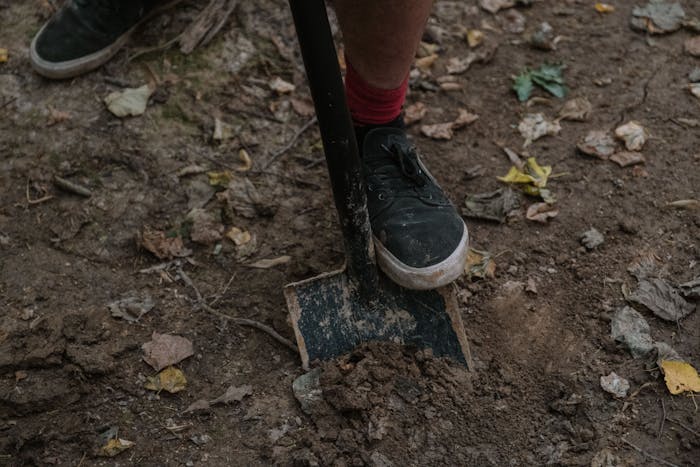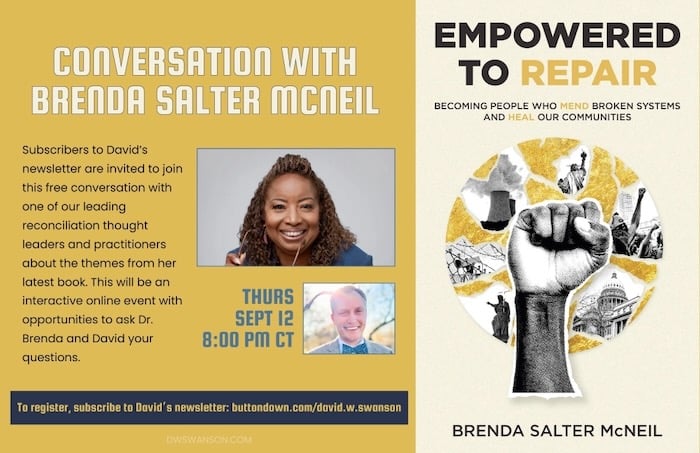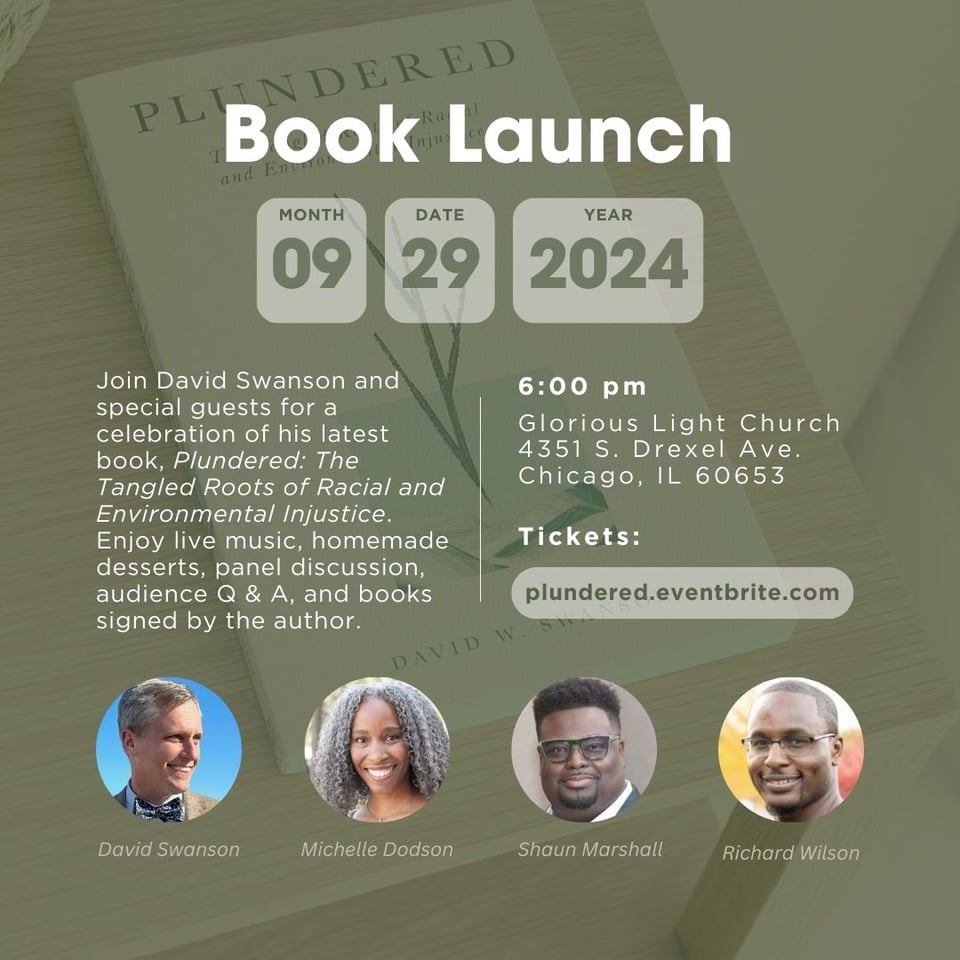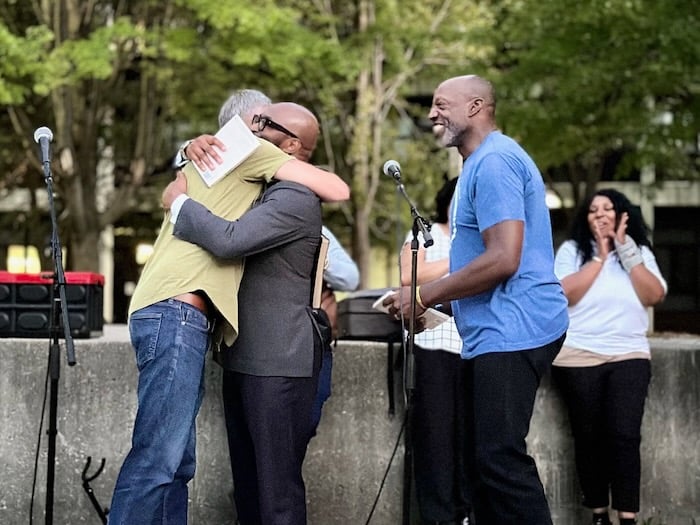Experiences of Cultivating Belonging
Stories of learning to love and be loved by our places
I’ve been writing these intermittent missives for a few years and this is my favorite. Why? Because you wrote it! Last week I wrote about cultivating belonging in our places and I ended by asking for your experiences. Below you’ll find four of those responses and they’re each fantastic. A huge thanks to Aaron, Dawn, Bethany, and Richard for sharing their experiences.
But first, on Thursday I’m hosting a Zoom call for the subscribers of this newsletter with my friend and mentor, Dr. Brenda Salter McNeil. See below for more information. I hope to see you on Thursday!
OK, on to your responses…

Aaron Wolcott:
I very much enjoyed this newsletter and your thoughts on place and the impact that living a "placed" life can have on our care for the land and one another. It is a topic that I have been wrestling with a lot recently and even wrote a blog post about a few months ago. In case you're interested you can find it here. Similar to your musings, it was inspired by Wendell Berry.
I am coming on forty this year and the idea of rootedness and place is something I have struggled with for some time. Like you, I am [a missionary kid] and grew up in central and east Africa. After college I returned to work in Congo as a humanitarian and started my family there, but recently returned to California. Practicing rootedness is something we have tried wherever we live, but in a world that can feel so off-kilter it has not always been easy. Yet, I think it is necessary, because as you have noted in your newsletter, placeless people tend to care very little for the land and those around them. So many lessons to learn there!
Dawn Bradley:
In response to your question, “Do I belong to my community?” I would say that I am LEARNING to belong to my community, its people and the place. Also, I am learning the gospel is bigger than I thought.
I was born and raised in Florida and have lived in Florida all but a few years of my life. I have lived in this particular city, Orlando, for the past 40 years. However, it’s only been the past 4 years (since George Floyd) that I have been curious, explored, invested in my community. In an attempt to understand who I am as being shaped by my location, who we are as a people, and what is the history of my community, I have been intentional about a few things.
First, I subscribed to my local paper, the Orlando Sentinel. Wow! What an incredible wealth of information is offered to our community through this paper!
Second, I have visited many smaller local history museums in central and north Florida. These museums are preserving the local history and often tell the stories I never heard or were taught in school (Orlando, Mims, St Augustine, Ocoee) These afternoon and day trips have been so fascinating and convicting that other long weekend trips have occurred (New Orleans, Montgomery, Selma, Tuskegee). These smaller, local museums can easily be dismissed as they operate on a shoe string. They are not slick or “shiny” but they are doing the hard work of preserving history and, therefore, the community.
Third, I’ve been able to take advantage of events hosted by the City of Ocoee and the University of Florida recognizing the Ocoee and Rosewood massacres.
Fourth, when I have visited other large cities (Chicago and New York) I have been curious and intentional about my national history regarding civil rights, immigration, first persons. There are many museum and walking tours available at low cost.
Fifth, I’ve been intentional about seeking out new relationships with people who are different than me. That has looked like joining a church in Eatonville(historically black community 5 minutes from my house) and hosting lots of dinners with my neighbors and new church friends.
Thank you for helping me to not only better love God but also my neighbor and all of God’s good creation.
Bethany Ringdal:
I’m lucky enough to live on a 4-generation piece of land that happens to be just a boring suburban block. Not just lucky - it’s a choice we’ve made, now, over multiple generations. We could have had a cover house somewhere else, but this is home.
I feel this privilege very deeply because I work in full time ministry with refugees, who have had their place and people violently stolen from them. Many fear that they will never feel at home again. I see in the Hebrew Bible that belonging to a people AND a land is central to God’s vision for God’s people. It’s not a side-thing. So those of us who do feel at home have a responsibility to create the possibility of belonging for people who have been forcibly uprooted. And maybe we shouldn’t casually do that violence to our own selves.
My commitment to the land that homes me mostly comes through in the gardens I keep here. We grow food and flowers and native plants, more every year. I’m amazed when I just watch at what will plant itself. I have a goal of offering reparations to the land, which has also been stolen from itself and made into so much bland lawn. I also want this land to be a good space for neighbors to neighbor in, which right now happens with neighbor kids making mud potions with my rain barrels.
Anyways, that’s the view from here.
Richard Clark:
I was feeling a lot of the struggles you articulate here a while ago, and it's one of the reasons I was inspired to create "Area Code: Batavia" which I describe as "A podcast about what it means to belong in Batavia, IL." It's been a really interesting and enriching exercise to have deep conversations with locals here, about what their experience with belonging in our town has been like. And the reaction has been striking - I think a lot of people feel this tension - the pull between issue-based online communities and conversations and how things play out in their own communities.
In fact, one thing I've become convinced of is how universal that struggle to belong really is these days, and how so many of us stop short of helping others belong because we don't feel we belong ourselves. I think there are a ton of reasons for this. For the more priviliged, it's self-inflicted. Especially in the suburbs, there's a sense that you can go to any other suburbs for whatever reason. So you're less invested in your own town, almost with the mindset of a tourist. Then there's the constant siren call of social media and online communities, and the ability to travel wherever you feel most comfortable or think of as your true "home".
For the less priviliged, I think it's less self inflicted and more just a reality of how things shake out. Almost every time I ask about belonging on my podcast, they say something about volunteering - it's a nice idea, but I find the less money you have, the less opportunity you have to volunteer. It's just a lack of margin, and that can feel really frustrating because you kind of get the sense that you're "lazy" or "not good enough." And even when you do show up, it can be hard to break through - in the kind of universal, group clustering kind of way, you just kind of feel like an outsider.
A huge part of "making a difference" in our community is shedding that imposter syndrome, the feeling that while we may live here, we don't technically belong in the same way others might.
Conversation With Brenda Salter McNeil

I hope you’ll join me on Thursday as we talk with Rev. Dr. Brenda Salter McNeil about the themes from her latest book. Feel free to invite a friend but to join they’ll need to register ahead of time.
Chicago Book Launch

Later this month we’ll celebrate the publication of Plundered with a launch party. If you’re anywhere near Chicago, please join us! It’s going to be a great evening – live music, tasty desserts, some very special guests – and proceeds from ticket sales benefit New Community Outreach. Get yours here!
The View From Here

One of my favorite things is to invite a few local churches together for an outdoor service of worship and prayer. Earlier this week, at the end of the service, I got to present my book to a couple of dear friends, pastors Chris Harris and Michael Neal. I’ve learned so much from these men over the years and it was a privilege to include their stories on the book.